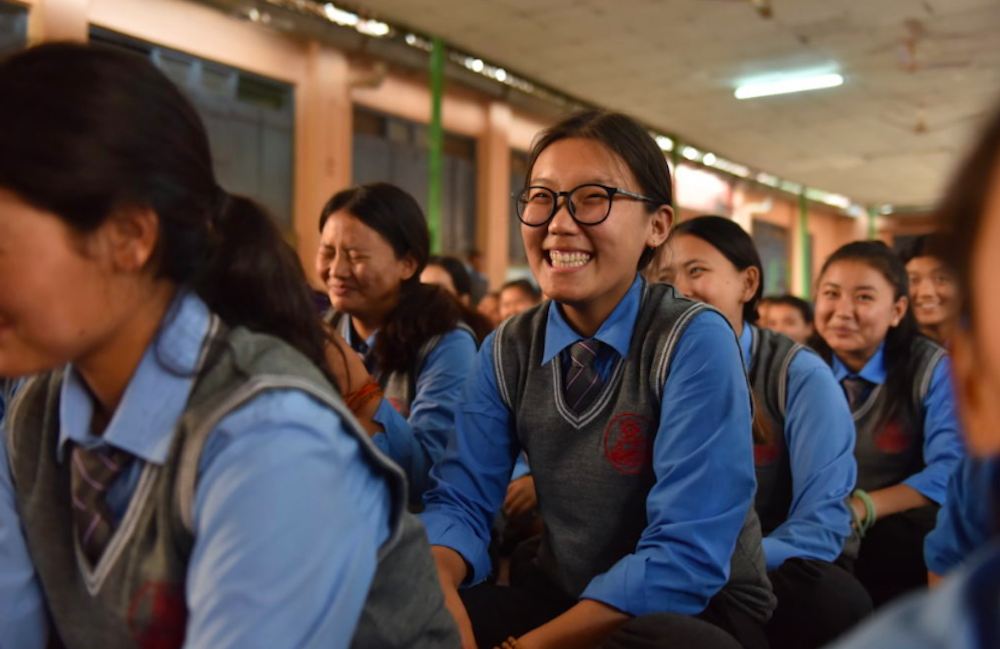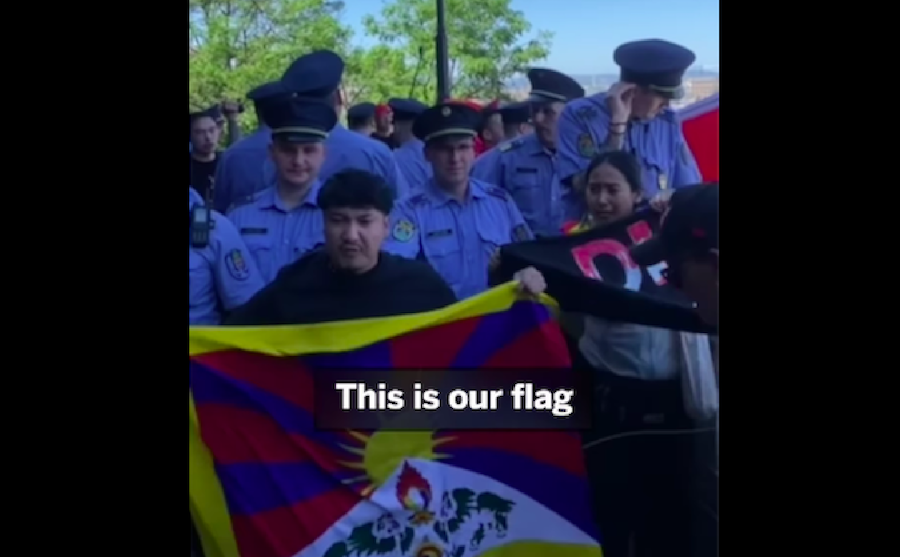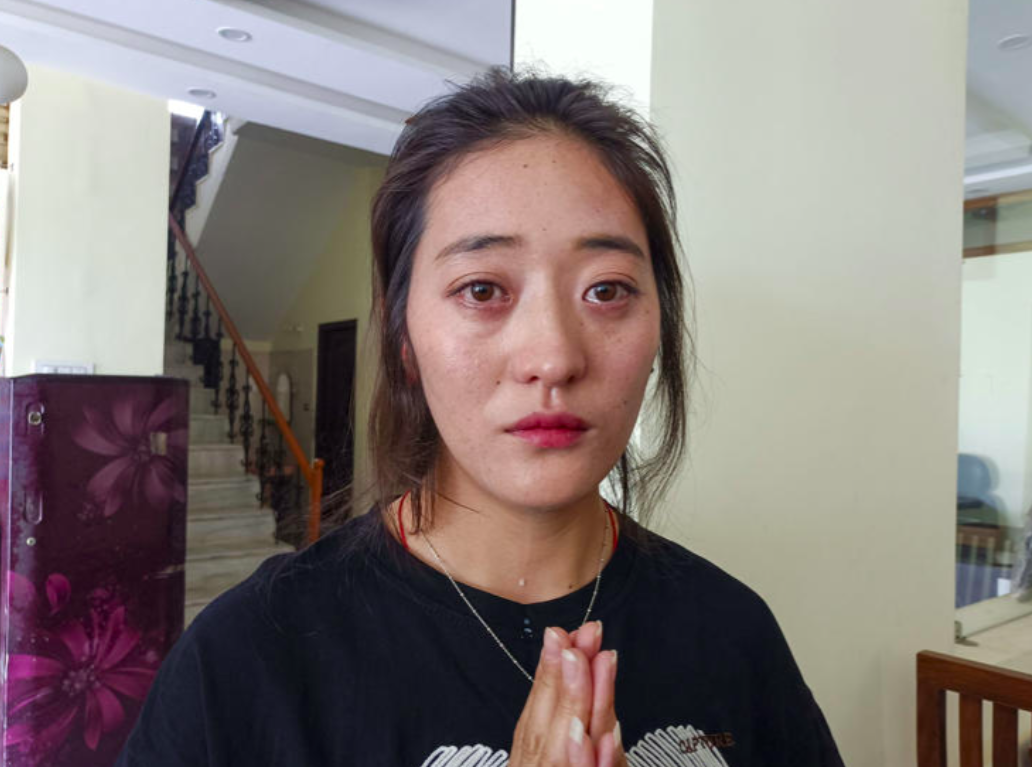By Mo Yan-chih and Ko Shu-ling
STAFF REPORTERS
Wednesday, Mar 19, 2008-Chinese Nationalist Party (KMT) presidential candidate Ma Ying-jeou (馬英九) yesterday reiterated his call for China to end its suppression of Tibet, and said that, if elected, he would not rule out boycotting the Beijing Olympics if the situation in Tibet deteriorated.
“If the Chinese government continued its suppression of Tibetans, and the situation in Tibet worsens, I would not rule out stopping athletes from attending the 2008 Beijing Olympics,” Ma said in Miaoli County.
In a six-point statement issued to protest China’s violent crackdown on Tibetans, Ma condemned Chinese Premier Wen Jiabao (溫家寶) for opposing the Democratic Progressive Party’s (DPP) UN referendum bid and any attempts to change the “status quo” in the Taiwan Strait.
“The Republic of China [ROC] is a democratic country that enjoys sovereignty. The future of Taiwan will be decided by 23 million Taiwanese people, and we won’t allow China’s interference,” Ma said. “Wen’s remarks are outrageous and unreasonable, arrogant, dumb and pretentious. We strongly protest his ignoring the mainstream opinion of the 23 million Taiwanese people.”
Wen told a press conference in Beijing yesterday that Saturday’s referendums in Taiwan would change the fact that Taiwan belonged to China.
“We are opposed to the so-called referendum schemes for Taiwan’s membership in the United Nations,” Wen said. “That would deal a serious blow to cross-strait relations, that would harm the fundamental interests of the people on both sides, cause tensions in the Taiwan Strait and threaten peace in the Taiwan Strait and the Asia-Pacific region at large.”
Matters that involved the territory and sovereignty of China should be decided by Chinese people, including the Taiwanese, and any attempts to separate Taiwan from China will not succeed, Wen said.
Ma said yesterday that he would spare no effort to apply for UN membership if elected, as entering the UN was the collective wish of Taiwanese people.
The KMT referendum calls for rejoining the UN under the formal title of the ROC, or any other “practical” title.
The DPP’s UN referendum calls for joining the UN under the name “Taiwan.” The KMT has called for a boycott of the DPP’s referendum.
Ma yesterday also reiterated his “three noes” policy on cross-strait relations — no unification, no independence and no use of force — and said his policy would help maintain the cross-strait “status quo,” which was supported by the majority of Taiwanese.
Ma also pledged to invite diplomatic allies to join him and extend their support for the Tibetans and the Dalai Lama, and urged Beijing to initiate talks with the Dalai Lama.
Ma’s camp held a candlelight vigil last night at Ketagalan Boulevard to protest Beijing’s use of force in Lhasa.
After addressing the vigil, Ma and camp members carried candles as they walked to Taiwan Democracy Memorial Hall to pay their respects to a group of Tibetan exiles who began a sit-in on Monday night.
Earlier yesterday, DPP presidential candidate Frank Hsieh (謝長廷) criticized Ma for making “immoral” and “cruel” comments about Beijing’s crackdown in Tibet.
While the rest of the world condemned Beijing’s violence, Hsieh said that Ma had claimed it was unclear who should be held responsible for the crackdown and had urged the DPP to refrain from taking advantage of the incident.
“It is like rubbing salt in the wounds of the Tibetans,” Hsieh said. “It is unethical and cruel to isolate the Tibetans and vilify those showing them concern.”
Hsieh said he wanted to know when Ma believed would be a good time for China to crack down on Tibet — after the presidential election or after the Olympics?
“No government should suppress people demanding to decide their own future,” he said. “Those who speak for the perpetrator or for the oppressor are the friends of dictatorship.”
As for Ma’s threat to boycott the Games if the situation in Tibet worsened, Hsieh said Ma was constantly shifting his position.
Ma’s comment was made in haste and might sacrifice the country’s interest, Hsieh said.
“It would exert tremendous pressure on China if Ma were to relinquish unification with China and abandon the `one China common market’ to protest Beijing’s bloody crackdown,” he said.
Hsieh said that he had long suspected Ma is a “cold-hearted” person and that his remarks about Tibet only proved that Ma was indeed ruthless.
Internationalizing China’s abuse of human rights is a way to protect Taiwan, Hsieh said, because only if Taiwan cares about Tibet will the world care about Taiwan.
Hsieh’s campaign office also issued a statement opposing China’s crackdown on Tibet, opposing China’s intimidation of Taiwan and opposing Ma’s ultimate desire for unification with China.
Hsieh said that Wen’s attempt to blame the Dalai Lama for the unrest reminded him “that the remarks by totalitarian regimes are all the same, as the KMT blamed [my] campaign team for plotting the skirmish caused by four KMT legislators who barged into our campaign office [last week].”
Hsieh said both Ma and Wen promoted unification.
“I would like to know whether Ma will accept the `one China’ principle since he has promised to negotiate with Beijing one year after taking office,” Hsieh said. “I would also like to know how he plans to complete the negotiations if he does not accept Beijing’s terms.”
Hsieh urged Ma to abandon the idea of unification and a “one China common market.”
Meanwhile, Government Information Office Minister Shieh Jhy-wey (謝志偉) rebuffed Wen’s comment that China “hoped to resume peace talks across the Strait as soon as possible.”
“If China wanted to convince Taiwan of its sincerity in cross-strait peace talks, it should first permit Tibetans to declare independence and give Tibetans their religious freedom,” Shieh said.
“It is ironic that China is preaching the spirit of peace while staging a crackdown in Tibet,” he said, adding that China’s offer of talks while targeting its missiles at Taiwan seemed more like a threat.
Shieh said the manner in which China has handled Tibet reflected what Beijing’s “one China” principle is all about, adding that Taiwan was “lucky” to be able to enjoy democracy, human rights and freedom in the face of Beijing’s actions.
“Holding the UN referendums and moving toward independence are two different things. We want to join the UN because we want to share democracy, human right and freedom with the international community and help promote these values,” Shieh said.
The Mainland Affairs Council also issued a statement yesterday condemning Wen’s claim that Taiwan has no right to proceed with the UN referendums on Saturday because it is part of China.
“The Republic of China is a democratic, free, independent country. Self-determination is a right of the 23 million Taiwanese,” the council said.
The council also reproached China for using brutal measures against Tibetans and urged Beijing to stop smearing the Dalai Lama.
Additional reporting by Shih Hsiu-chuan, Jenny W. Hsu and AP









